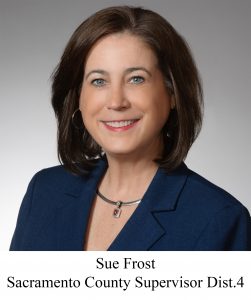 Link the Crime Back to Serving Time
Link the Crime Back to Serving Time
Written by Sacramento County Supervisor Sue Frost
A discussion taking place amidst the COVID-19 pandemic is the reduction of jail populations due to the high risk of spreading COVID-19 in the jails. Most recently, the Governor’s office announced a further reduction of the state’s prisoner population by 8,000. For many people in my District, these actions receive great concern for public safety implications. As an assurance, announcements about releases remind the public that prisoners being released are strictly non-violent offenders. But are they really?
California has a history of creating policies answering the call for criminal justice reform that reduces penalties and jail populations. On the surface, that sounds fine. Overcrowding in jails and prisons is a serious problem, and if we can reduce those populations by revisiting what society deems worthy of a stay in jail, why not do just that? The problem though, is that it is not exactly what has occurred in the past. Violent crimes have been redefined to omit actions I think most people would agree should merit some serious jail time.
Measures like Proposition 47, Proposition 57, and AB 109, have left crimes like domestic violence, rape of an unconscious person, and the trafficking of children out of what constitutes a violent crime when considering parole. To me and others, that is a ghastly omission. And since the implementation of those measures, California has seen a steady increase in violent crimes, particularly in the most populous cities. It is not difficult to draw a line from the release of violent criminals to an increase in violent crimes.
Fortunately, Californians will have the opportunity to rectify the situation moving forward. The Reducing Crime and Keeping California Safe Act of 2020 will be on the ballot as Proposition 20. Proposition 20 will restore violent crimes, such as felony assault with a deadly weapon, back to being considered violent crimes, and prevent the early release of some of California’s most dangerous criminals.
Proposition 20 has other components to address rising crime rates in California, including theft. Many I have heard of and even witnessed individuals running out of stores with stolen goods with no fear of consequences because if they steal less than $950, under Proposition 47, it is not a felony, and therefore more trouble to prosecute than it is worth. Proposition 20 will change that to make the 3rd time being caught stealing over $250 worth of goods a felony. This will address the increase in theft seen since the implementation of the “criminal justice reforms.”
Among the reforms of Proposition 20, there are also changes to the parole process and acquisition of DNA from criminals. DNA continues to be invaluable in solving unsolvable crimes. Increased use of DNA can not only reveal the guilty but exonerate the innocent. What Proposition 20 does not do is put the pin back in the grenade. We cannot retroactively send people back to jail, and we do not need to do that in all cases. What we can do is make sure that California becomes safer moving forward. Keeping violent criminals off the streets for as long as possible seems to me like the best way to start.
Thank you for reading – and as always, if you want to contact me, call me at 916-874-5491, or e-mail me at SupervisorFrost@saccounty.net.
Sue Frost represents the 4th District, which includes all or part of the communities of Citrus Heights, Folsom, Orangevale, Antelope, Rio Linda, Elverta, Gold River, Rancho Murieta, North Highlands, Carmichael, Foothill Farms and Fair Oaks
 Defunding Police isn’t the Answer
Defunding Police isn’t the Answer
Written by Sacramento County Supervisor Sue Frost
The killing of George Floyd was horrific – and the officers responsible have been arrested and will stand trial. But now politicians and activists are blaming everyone in a uniform. “Defund the police” has become the rallying call for protesters.
Activists want to strip money from law-enforcement, disband police, close jails and prisons, then divert public funds to community groups, counselors, and social workers for “community empowerment.” What does that mean? It means instead of police and sheriffs enforcing the law, taxpayer funds will go to private non-profits run by activists and programs like “Advance Peace” which pays gang members $500 a month not to shoot each other.
How will reducing the number of police officers make the community safer? In 2018, police officers arrested 11,970 murderers, 495,900 violent criminals, and more than 1 million drunk drivers. In February of this year, a months-long investigation resulted in 518 arrests when police smashed a human trafficking ring and rescued hundreds of children who were being sold into prostitution. Do activists think that councilors and community groups are going to detain violent gang members, break human trafficking rings, or get drunk drivers off our roads? No alternative to an organized, well-funded, and well-trained police force offers enforcement ability on such a high level.
In Los Angeles, Mayor Eric Garcetti recently announced that he was going to “defund police” by cutting $150 million from the LAPD budget. Cities like San Francisco, Portland, Minneapolis, and Baltimore have announced that they will pursue efforts to “defund police.” Political “leaders” in Congress and State Houses have echoed the call and introduced legislation to cut funding for law enforcement – or punish jurisdictions who refuse to do so.
The vast majority of police budgets go to personnel, so the budget cut means one thing: firing police officers. Which officers will be fired? A common practice for addressing mass budget reductions through layoffs and that has been used by the LAPD in the past is LIFO (last in, first out). That means that Garcetti’s “defund” policy will result in firing recent recruits – young black, Asian and Latino officers who were recruited from, and reflect, the very neighborhoods who are underrepresented and suffer the most from crime.
Sadly, this movement is not new. In 2015 Camden New Jersey pushed a “defund police” measure. They dismantled their department and disbanded the police officers’ union. They placed some activists in oversight positions and hired most the police back – at a lower salary. Some believe the effort was really more about breaking the union than reforming the system. Today, many of the same complaints have returned.
Eliminating law enforcement is the opposite of a solution – we cannot abandon our communities to the whims of gangs and criminals who prey on neighborhoods. We do need to encourage investment in poor neighborhoods where crime is rampant, schools are failing, and hope is abandoned. Empowerment zones, school choice, and incentives for investment have seen tremendous success.
Communities that partner with police, rather than fight with them, have seen a marked improvement in crime reduction, complaints against police, and more recruitment of people from the community into law enforcement – community members who have relationships and earnestly want to make lives better – and have the training to enforce the law.
This rush to respond to “defund police” activists is not reform – it is retribution and appeasement. And it is dangerous. The result will be every community and every resident will be less safe.
We need more community engagement and understanding, not less. We should be investing in more training, recruiting, and community engagement, not eliminating prisons and defunding police.
Thank you for reading – and as always, if you want to contact me, call me at 916-874-5491, or e-mail me at SupervisorFrost@saccounty.net.
Sue Frost represents the 4th District, which includes all or part of the communities of Citrus Heights, Folsom, Orangevale, Antelope, Rio Linda, Elverta, Gold River, Rancho Murieta, North Highlands, Carmichael, Foothill Farms and Fair Oaks
